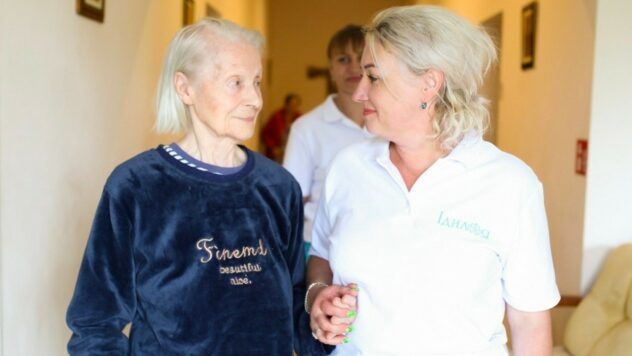Old age does not always come quietly. Sometimes it comes with anxiety, chronic pain, disorientation, or a breakdown in social connections.
It’s hard to watch how a loved one, who was independent yesterday, today has difficulty remembering why he went into the kitchen or cannot get out of bed without help.
Sooner or later, the family faces a choice: how to provide decent care? One solution may be to place an elderly relative in a nursing home.
Now watching
In this article we will tell you in detail how it works in Ukraine – under what conditions the elderly are accepted, where to go and what you need to know in order not to make a mistake with your choice.
When an Elderly Person May Need Guardianship
The first warning signs are not always medical. An elderly person may be physically strong, but suffer from loneliness, not cope with everyday life, and be afraid to go outside.
Or, on the contrary, it may require constant monitoring: taking medications on schedule, following a diet, being under observation after a stroke, hip fracture, or heart attack.
Care requires resources – emotional, time, physical. If you don't have enough, don't wait until you're completely exhausted.
A nursing home is not a death sentence. It is an opportunity to delicately delegate care to specialists, while maintaining human relationships with your loved one.
What types of nursing homes are there in Ukraine
There are both state and private institutions for the elderly in Ukraine. They differ greatly in terms of conditions, approach and accessibility.
State boarding schools (territorial centers, gerontological institutions) provide housing, care and food free of charge – but only if certain conditions are met.
Private – these are paid boarding houses that take care of not only, but also create an atmosphere of comfort, safety, and communication. Both bedridden patients and active pensioners can live here.
For example, Idyllia, a nursing home in Kyiv, offers nursing supervision and home care, individual nutrition, and adapted conditions for living with dementia, Alzheimer's disease, and during the post-operative recovery period.
Accommodation here is paid, but it is suitable even for those who have a family: the boarding house simply becomes a new form of care.
How to get into a state nursing home
In order to register an elderly person in a state nursing home, a number of conditions must be met.
- age 60+ (sometimes with disability groups 1–2);
- absence of able-bodied relatives who are legally obligated to provide care;
- difficult life situation – lack of housing, income, ability to care for oneself.
If an elderly person has children or other able-bodied relatives, social protection agencies will take into account the possibility of family care – in accordance with the provisions of the Family and Civil Codes.
Registration is done through social security agencies (Social Policy Department). The following documents are required:
- passport and tax identification number;
- medical certificate;
- income certificate;
- conclusion of the medical commission on the need for inpatient care;
- Act of inspection of living conditions (if there is housing).
The application is processed within a few weeks or months, depending on the availability of places, as there is a waiting list.
In some cases, a person must formally renounce their own housing in favor of the state, especially if we are talking about lifelong maintenance on full state support.
The elderly person continues to receive a pension, but does not have full control over it.
Typically, about 75% is automatically transferred to the institution to cover expenses (within the framework of legal norms), and the remaining funds remain with the ward for personal needs.
You can stay in a state boarding house for life if your health allows it.
The conditions are basic: several people in a room, a common daily routine, a standard menu, a fixed visiting schedule.
You can bring personal belongings, clothing, and personal care items with you, but furniture or equipment, as a rule, cannot.
State boarding schools are a solution that helps older people who find themselves in social isolation or difficult life situations to receive housing, food and care.
But due to limited resources and strict admission requirements, not every family can count on this path, even if it seems logical from a budgetary point of view.
How to register an elderly person in a private boarding house
There are few restrictions in private clinics: they accept elderly people of any activity level, with disabilities, dementia, after operations. But there are important exceptions.
They may refuse if:
- the person is aggressive, inadequate, requires hospitalization in a psychiatric institution;
- intensive care or emergency medical intervention is required;
- There are infectious diseases.
You can apply directly, without a referral, commission or waiting in line. The process is maximally adapted to the family:
- Consultation. You learn the conditions, choose a suitable boarding house, discuss the features of care.
- Registration. Only basic documents are required – passport, tax identification number, doctor's note (if available).
- Check-in. At the boarding house, they will ask you in detail about your diet, medication intake, habits. Everything – without bureaucracy and stress.
Before moving in, there will usually be a preliminary interview or inspection to ensure that the care home can provide the level of care required.
Most private institutions in Ukraine provide not only medical care, but also rehabilitation, leisure, and creation of a comfortable psychological environment.
For example, in such places, elderly people can walk around the area, do handicrafts, listen to lectures, attend film screenings – and at the same time be under the supervision of experienced caregivers and nurses.
If you are looking, do not hesitate to come in person, take a look, and talk to the staff.
Truly good boarding houses in Ukraine are not just buildings with beds, but places where old age is met with dignity and comfort.

